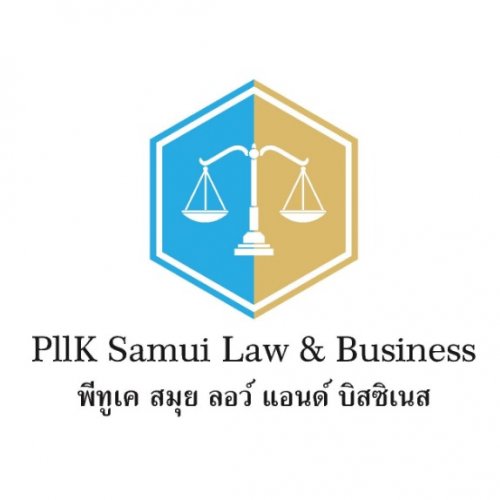Best Corporate & Commercial Lawyers in Surat Thani
Share your needs with us, get contacted by law firms.
Free. Takes 2 min.
List of the best lawyers in Surat Thani, Thailand
About Corporate & Commercial Law in Surat Thani, Thailand
Corporate and commercial law governs the formation, operation, and regulation of businesses and commercial transactions in Surat Thani, Thailand. As a key province in southern Thailand, Surat Thani attracts both local and international entrepreneurs who wish to establish or expand businesses in the area. Corporate and commercial law covers many aspects including company registration, compliance requirements, contracts, mergers and acquisitions, intellectual property, and dispute resolution. Familiarity with Thai business regulations and local procedures is important for smooth business operations and sustainable growth.
Why You May Need a Lawyer
There are several instances where seeking legal guidance is essential in the field of corporate and commercial law in Surat Thani. You may require a lawyer if you are setting up a new business entity, drafting or reviewing contracts, handling employment matters, resolving shareholder or partnership disputes, pursuing mergers or acquisitions, protecting intellectual property, or addressing compliance with government rules. Lawyers can also help with issues concerning leasing or buying commercial property, navigating foreign ownership restrictions, and dealing with cross-border trade. Having a local legal expert not only ensures compliance with Thai laws but also helps to minimize risks associated with business operations.
Local Laws Overview
The legal landscape for corporate and commercial matters in Surat Thani is shaped by both national laws and provincial practices. Some of the most relevant laws include the Thai Civil and Commercial Code, Foreign Business Act, Company Act, and various tax regulations. Businesses may operate as partnerships, limited companies, or public companies, each with distinct formation and compliance rules. Foreign investors should be aware that certain business sectors are restricted or require special licenses. Contract enforcement, employment standards, and intellectual property protection are governed by national legislation, but local administrative offices and courts in Surat Thani handle registrations, filings, and disputes. It is vital to stay updated on both statutory requirements and local administrative practices.
Frequently Asked Questions
What is the process for registering a company in Surat Thani?
Registering a company in Surat Thani involves reserving the company name, preparing necessary documents such as the Memorandum of Association, registering the company with the Department of Business Development, and obtaining relevant tax and municipal licenses. The whole process is guided by national regulations but carried out at local government offices.
Are there any restrictions on foreign-owned companies in Surat Thani?
Yes, the Foreign Business Act sets out sectors where foreign ownership is restricted or special permissions are required. Some industries may allow up to 49 percent foreign shareholding unless a specific business license is obtained or a treaty applies.
How can I protect my business contracts in Surat Thani?
All contracts should be drafted clearly, stating rights and duties of all parties, and preferably be written in Thai or include an authorized Thai translation. Legal review can help prevent misunderstandings and facilitate enforcement in Thai courts if disputes arise.
What are the compliance requirements for a limited company?
Limited companies must hold annual general meetings, file financial statements with the Department of Business Development, keep accurate accounting records, pay relevant taxes, and ensure all official information is kept up to date with the local authorities.
How are commercial disputes resolved in Surat Thani?
Most commercial disputes are resolved through negotiation, mediation, or litigation in local courts. Arbitration is also available if parties agree to it in their contract. Legal representation helps in negotiating settlements or navigating the court procedures.
What employment laws should businesses be aware of?
Thai law sets minimum wage, working hours, overtime, social security contributions, and termination procedures. All employment contracts must comply with these national standards, and non-compliance can lead to penalties or disputes.
Can I acquire an existing business in Surat Thani as a foreign investor?
Yes, acquiring an existing business is possible but may be subject to foreign shareholding limitations depending on the business sector. Due diligence and proper transfer procedures should be conducted to ensure compliance.
What tax obligations do businesses in Surat Thani have?
Businesses must register for VAT if revenues exceed the threshold, submit regular tax filings, withhold taxes where applicable, and pay corporate income tax at prescribed rates. Consulting with a local accountant or tax lawyer is advisable.
How can I protect my intellectual property in Surat Thani?
You can register trademarks, patents, and copyrights through the Department of Intellectual Property in Thailand. Local legal assistance can ensure proper filing, enforcement, and defense of your intellectual property rights.
What should I consider when leasing commercial property?
It is important to review lease agreements for terms on rent, duration, renewal, termination, and responsibilities for maintenance. Conducting due diligence on land ownership and zoning is strongly advised before signing any contract.
Additional Resources
- Department of Business Development (DBD) - Handles company registration, business licenses, and corporate filings. - Provincial Commercial Office, Surat Thani - Provides local regulatory guidance and support. - Board of Investment (BOI) Thailand - Offers information and incentives for foreign investors. - Department of Intellectual Property (DIP) - Responsible for intellectual property registration and enforcement in Thailand. - Thai Chamber of Commerce and Board of Trade - Provides networking and legal resources for business owners.
Next Steps
If you require legal assistance in corporate and commercial matters in Surat Thani, start by identifying your legal needs and gathering all relevant documents. Contact a qualified local lawyer with experience in Thai business law. Arrange an initial consultation to discuss your situation and review your options. Your lawyer can guide you through business registration, contract drafting, regulatory compliance, dispute resolution, and ongoing legal maintenance. Using professional legal support is the best way to ensure your business complies with local laws and operates successfully in Surat Thani.
Lawzana helps you find the best lawyers and law firms in Surat Thani through a curated and pre-screened list of qualified legal professionals. Our platform offers rankings and detailed profiles of attorneys and law firms, allowing you to compare based on practice areas, including Corporate & Commercial, experience, and client feedback.
Each profile includes a description of the firm's areas of practice, client reviews, team members and partners, year of establishment, spoken languages, office locations, contact information, social media presence, and any published articles or resources. Most firms on our platform speak English and are experienced in both local and international legal matters.
Get a quote from top-rated law firms in Surat Thani, Thailand — quickly, securely, and without unnecessary hassle.
Disclaimer:
The information provided on this page is for general informational purposes only and does not constitute legal advice. While we strive to ensure the accuracy and relevance of the content, legal information may change over time, and interpretations of the law can vary. You should always consult with a qualified legal professional for advice specific to your situation.
We disclaim all liability for actions taken or not taken based on the content of this page. If you believe any information is incorrect or outdated, please contact us, and we will review and update it where appropriate.
Browse corporate & commercial law firms by service in Surat Thani, Thailand
Surat Thani, Thailand Attorneys in related practice areas.










